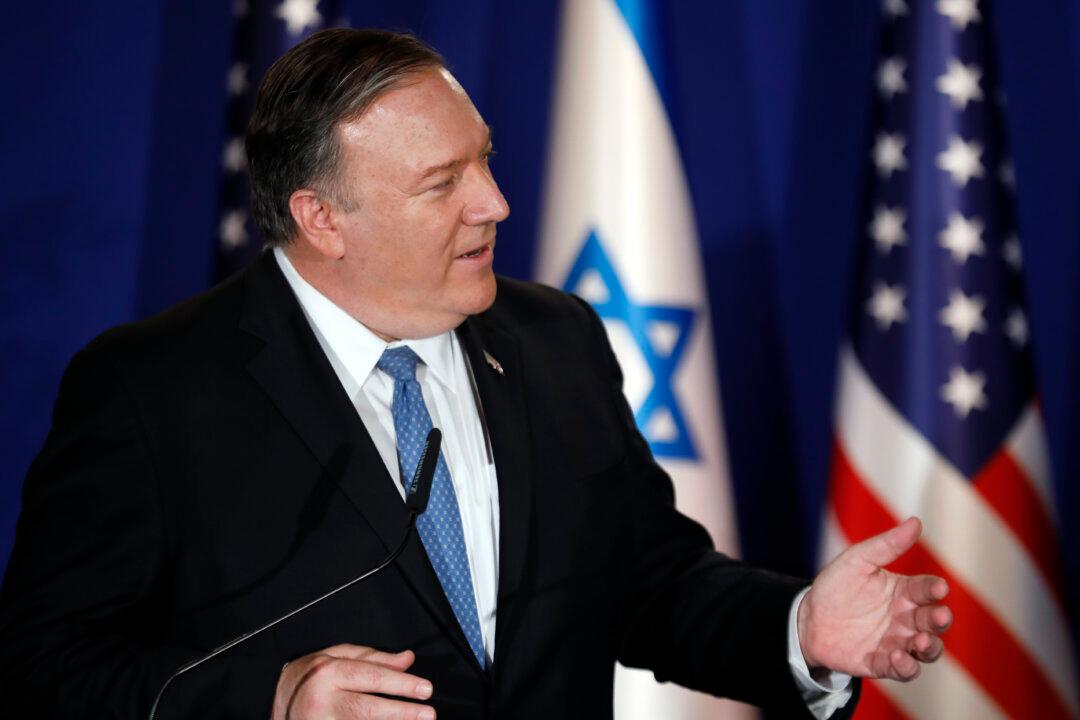While in Israel on a two-day visit, U.S. Secretary of State Mike Pompeo warned that the security risks of China’s continued investments in Israel could compromise future intelligence-sharing and other cooperation between the United States and its Middle Eastern ally.
Pompeo made the comments during a March 21 interview with local Israeli broadcaster Channel 13.
“We want to make sure every country is wide-eyed and awake with regard to the policy threats posed by China,” he said, according to Times of Israel. “America will have to make decisions too. If certain systems go in certain places, then America’s efforts to work alongside you will be more difficult, and in some places we won’t be able to do so.
“Intelligence sharing might have to be reduced, co-location of security facilities might have to be reduced, we want to make sure countries understand this and know the risks,” he added.
The comments came on the heels of a new report on Israel-China relations published that same day by U.S. policy think tank RAND, which outlined “security concerns” and “espionage risks” associated with China’s ambitions to acquire high-tech through investments in Israeli tech firms. The Chinese regime also seeks to take advantage of Israel’s strategic geographic location to invest in infrastructure projects that benefit China’s trade—“with insufficient returns for Israel” and possibly putting the United States at risk, according to the report.
US Alarm
These concerns are not new. Last November, the Hudson Institute published an analysis concluding that Beijing was investing heavily in Israel’s artificial intelligence and other cutting-edge tech sectors so that any military applications could be used to serve the Chinese military. Building such commercial ties, according to the Institute, would also help China bulk up its geopolitical influence in the Middle East.
Meanwhile, during a January visit to Israel, John Bolton, national security adviser to President Donald Trump, raised to the Israeli prime minister U.S. concerns about the country’s willingness to work with Chinese telecoms firms in sensitive tech sectors.
For example, Chinese telecoms giant Huawei has an research and development center in Israel, and in December 2016, acquired HexaTier, an Israeli cybersecurity startup.
Pompeo’s comments were the first indication that U.S. authorities would take direct action in Israel in the wake of China’s maneuvers.
The State Secretary mentioned Huawei specifically in his March 21 comments, explaining that the firm poses a “real risk to the people of Israel” due to the risk of the Chinese regime conducting espionage through its technology.
Another project highlighted by think tanks and U.S. officials alike is China’s successful bid to operate a private port at Haifa, a commercial hub that is also home to an Israeli naval base.
The base regularly hosts joint U.S.-Israel navy drills and visits by U.S. vessels.
Gary Roughead, a retired U.S. admiral, told Newsweek in a Sept. 14 interview, about the security implications: “The Chinese port operators will be able to monitor closely U.S. ship movements, be aware of maintenance activity, and could have access to equipment moving to and from repair sites, and interact freely with our crews over protracted periods.”





